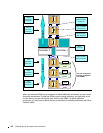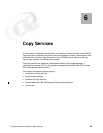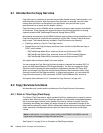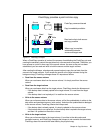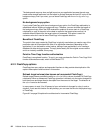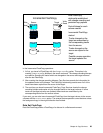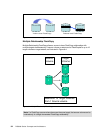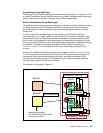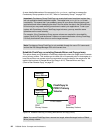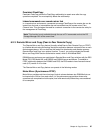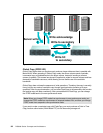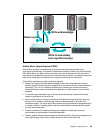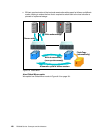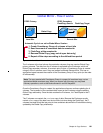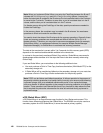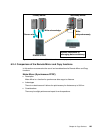
96 DS6000 Series: Concepts and Architecture
A more detailed discussion of the concept of data consistency and how to manage the
Consistency Group operation is in 6.2.5, “What is Consistency Group?” on page 105.
Establish FlashCopy on existing Remote Mirror and Copy primary
This option allows you to establish a FlashCopy relationship where the target is also a remote
mirror primary volume. This enables you to create full or incremental point-in-time copies at a
local site and then use remote mirroring commands to copy the data to the remote site. We
explain the functions of Remote Mirror and Copy in 6.2.3, “Remote Mirror and Copy
(Peer-to-Peer Remote Copy)” on page 97.
Figure 6-6 Establish FlashCopy on existing Remote Mirror and Copy primary
Important: Consistency Group FlashCopy can create host-based consistent copies; they
are not application-based consistent copies. The copies have
power-fail or crash level
consistency. This means that if you suddenly power off your server without stopping your
applications and without destaging the data in the file cache, the data in the file cache may
be lost and you may need recovery procedures to restart your applications. To start your
system with Consistency Group FlashCopy target volumes, you may need the same
operations as the crash recovery.
For example, If the Consistency Group source volumes are used with a journaled file
system (like AIX JFS) and the source LUNs are not unmounted before running FlashCopy,
it is likely that
fsck will have to be run on the target volumes.
Note: Consistency Group FlashCopy is only available through the use of CLI commands
and not the DS Storage Manager GUI at the current time.
Note: You cannot FlashCopy from a source to a target, where the target is also a Global
Mirror primary volume.
PPRC
Primary Volume
PPRC
Secondary Volume
PPRC relation
FlashCopy to
PPRC Primary
Volume
FlashCopy
Source Volume
FlashCopy
Target Volume



